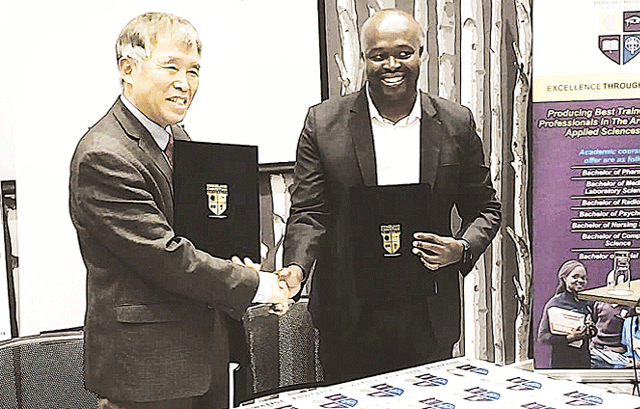By SIBUSISO DLAMINI | 2023-08-18

Emaswati’s unhealthy eating habits are a matter of death as they are the main risk factor for heart disease, diabetes and other forms of cancer, says Eswatini Medical Christian University (EMCU) Vice-Chancellor Paul Yang.
Yang shared this concern when speaking at the signing of a Memorandum of Understanding (MoU) between the institution and medical diagnostic laboratory, Biolab Eswatini.
The MoU will see the university’s students getting placements at Biolab, internships, staff training and knowledge sharing in conducting clinical trials. Yang noted with concern that whenever eating in restaurants or buying from supermarkets, locals ingest food rich in fat, has too much sugar and meat.
“Most of these foods are processed foods and are high in the bad kinds of sugars and fats,” he said.
fattening
“They do not contain water and fibre but added fat, salt and sugar, which makes them both less filling and more fattening, and that is for one’s health,” he added. Yang advised for lifestyle changes to avoid serious health problems that could develop, especially the adoption of lack of exercise. “In order to increase the life expectancy, which is at about 60 years of age in the country, we need to take care of our bodies,” he said.
Coming to the MoU, he said he hoped it would serve as an important opportunity to improve Emaswati’s health. “We hope that the students will grow into stewards of the country’s health system through exposure to Biolab,” he said.
Biolab’s Executive Director, Sibusiso Hlatjwayo, said they were pleased with the agreement as they wanted to be part of the solution to the country’s problems. “This business was born during COVID-19 when we realised that there was a huge gap in the public health system that needed to be filled and has only grown from then,” he said. Hlatjwayo explained that they have learnt a lot since then, as they used to take samples to South Africa but then realised the risks in health security.
“We are committed to improving the health system through deliberate investments because we are cognisant of the fact that the biggest gap in African healthcare is in diagnostics,” he added.
The executive director said Biolab genuinely valued partnerships because they understood that healthcare was an ecosystem. “We get calls from parents everyday complaining about how their children with expertise in our field are idle at home because of unemployment, so we are more than happy to have youngsters under our internship programme,” he added.
‘...Our services underutilised’
Clinical dietician, Nosiphephelo Hlatshwayo, says it is unfortunate that their services are underutilised yet they could help easily prevent the costly complications of chronic diseases such as diabetes and kidney failure.
“I agree with the fact that our diet is horrible to say the least and it is very sad that we are literally eating ourselves to an early grave when these diseases could have easily been avoided through dietary changes,” she said.
“We have adopted the way Americans eat and it is killing us,” she emphasised.
Hlatshwayo said the country had qualified dieticians in public hospitals who were sadly not consulted.
“The senior dietician, Thandi Kunene, who is based at the Mbabane Government Hospital is absolutely amazing at what she does and I can tell you now, she is even an expert in low-carbs diet but somehow we have locals who are still struggling with what they should do,” she stated.
“The same goes for my colleagues based in Manzini, Mankayane, Pigg’s Peak and at the Clinic Group,” she added, further highlighting that what was even more unfortunate was how even general practitioners were not referring patients to them when they know very well that the medication they prescribe could work even better with the right diet.
She explained that the presumption that eating healthy was expensive was false because Africans were healthy before they started consuming the food they were given after colonisation.
“We lived longer and we were much slimmer, so that should tell you that we went wrong somewhere along the line, and this needs to be fixed urgently. Just look at how obese our children are.” Hlatshwayo said.
“We need to eat plenty of fruits and vegetables and cut drastically on the carbohydrates because it is really not good for us,” she advised.
share story
Post Your Comments Below

Sisonkhe FC ……........….. (0)2
Mpendulo 55th, Thab...

THE recent turn of events at SwaziMed has underscored deep-rooted governance challenges that thre...
Health officials have reported a significant decrease in new HIV infections among men, in...
Social media users have reacted with shock and sorrow to the death of former Mhlume Unite...
All material © Swazi Observer. Material may not be published or reproduced in any form without prior written permission.
Design by Real Image Internet